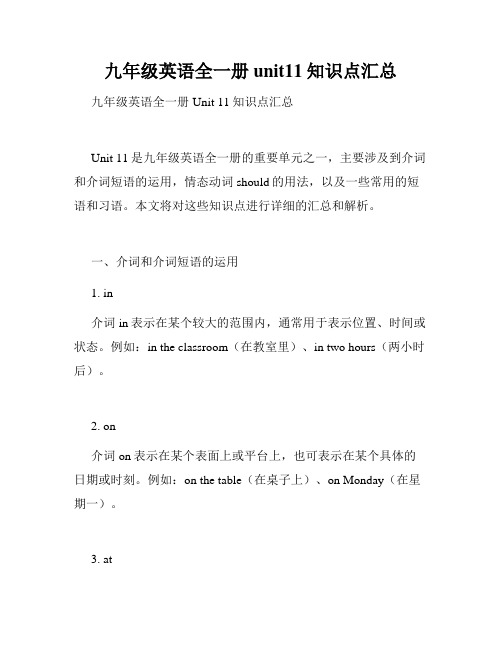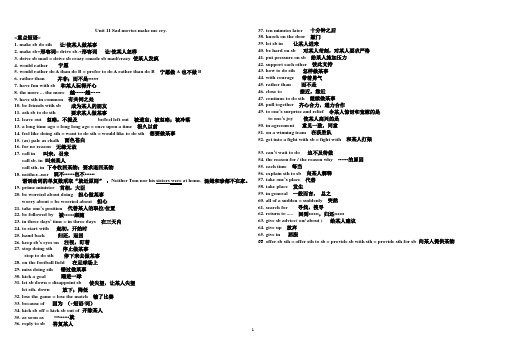九年级英语第十一单元重要知识点归纳(整理打印版)
九年级英语全一册unit11知识点汇总

九年级英语全一册unit11知识点汇总九年级英语全一册Unit 11知识点汇总Unit 11是九年级英语全一册的重要单元之一,主要涉及到介词和介词短语的运用,情态动词should的用法,以及一些常用的短语和习语。
本文将对这些知识点进行详细的汇总和解析。
一、介词和介词短语的运用1. in介词in表示在某个较大的范围内,通常用于表示位置、时间或状态。
例如:in the classroom(在教室里)、in two hours(两小时后)。
2. on介词on表示在某个表面上或平台上,也可表示在某个具体的日期或时刻。
例如:on the table(在桌子上)、on Monday(在星期一)。
3. at介词at表示在某个地点或某个具体的时间点上。
例如:at the bus stop(在公交车站)、at 9 o'clock(在9点)。
4. by介词by表示通过某种方式或手段,也可表示在某个时间之前。
例如:by bus(乘坐公交车)、by tomorrow(到明天为止)。
介词和介词短语的运用在语言学习中非常重要,正确的使用可以增强句子的表达能力和准确性。
二、情态动词should的用法情态动词should表示建议、劝告、命令或期望,常用于祈使句或陈述句中。
例如:You should study harder.(你应该更加努力学习。
)should的否定形式为should not或shouldn't,表示禁止或不应该做某事。
例如:You shouldn't eat too much junk food.(你不应该吃太多垃圾食品。
)应用should不仅能够增强表达的明确性,还能够使语言更加礼貌和客观。
三、常用短语和习语1. make sure这个短语的意思是确保某事,常用于保证某件事情发生或不发生。
例如:Make sure to bring your passport when you travel abroad.(出国旅行时确保携带护照。
九年级全一册英语第十一单元知识点总结

九年级全一册英语第十一单元知识点总结
第十一单元是九年级全一册英语中的一个单元,主要涉及到自然
灾害和我们的身心健康。
以下是该单元的知识点总结:
1.自然灾害词汇:地震(earthquake)、洪水(flood)、火山爆
发(volcanic eruption)、龙卷风(tornado)、台风(typhoon)等。
掌握这些词汇的拼写和意思。
2.描述自然灾害的表达:掌握如何用英语描述自然灾害。
例如,
描述地震时可以说“the ground shook”,描述洪水时可以说“the river flooded”等。
3.自然灾害防范:了解如何预防和减少自然灾害对我们的影响。
例如,建立地震避难所、加强早期预警系统、树立环保意识等。
4.身心健康词汇:锻炼身体(exercise)、均衡饮食(balanced diet)、良好的睡眠(adequate sleep)、心理健康(mental health)等。
了解这些词汇的意思和如何运用。
5.身心健康的重要性:了解身心健康对我们的重要性,如何保持身心健康。
例如,保持积极的心态、保持良好的作息时间、结交好朋友等。
6.健康问题的交流:学会用英语探讨和交流健康问题,表达自己的观点和建议。
例如,描述自己的健康状况、询问他人的健康问题、给出建议等。
7.阅读技巧:培养阅读技巧,例如猜词义、理解上下文、找出主旨等。
这些技巧可以帮助我们更好地理解和分析阅读材料。
这些是九年级全一册英语第十一单元的知识点总结。
通过学习和掌握这些内容,可以更好地理解和运用英语,同时也能增长关于自然灾害和健康的相关知识。
九年级英语第十一单元重要知识点归纳(整理打印版)

Unit 11 Sad movies make me cry.<重点短语>1.make sb do sth 让/使某人做某事2.make sb+形容词= drive sb.+形容词让/使某人怎样3.drive sb mad = drive sb crazy =made sb mad/crazy 使某人发疯4.would rather 宁愿5.would rather do A than do B = prefer to do A rather than do B 宁愿做A也不做B6.rather than 并非;而不是……7.have fun with sb 和某人玩得开心8.the more ... the more 越……越……9.have sth in common 有共同之处10.be friends with sb 成为某人的朋友11.ask sb to do sth 要求某人做某事12.leave out 忽略,不提及be/feel left out 被遗忘;被忽略;被冷落13.a long time ago = long long ago = once upon a time 很久以前14.feel like doing sth = want to do sth = would like to do sth 想要做某事15.(as) pale as chalk 面色苍白16.for no reason 无缘无故17.call in 叫来,召来call sb. in 叫来某人call sth. in 下令收回某物;要求退回某物18.neither...nor 既不……也不……谓语动词的单复数采取“就近原则”:Neither Tom nor his sisters were at home. 汤姆和珍都不在家。
19.prime minister 首相,大臣20.be worried about doing 担心做某事worry about = be worried about 担心21.take one’s position 代替某人的职位/位置22.be followed by 被……跟随23.in three days’ time = in three days 在三天内24.to start with 起初,开始时25.hand back 归还,退回26.keep sb’s eyes on 注视,盯着27.stop doing sth 停止做某事stop to do sth 停下来去做某事28.on the football field 在足球场上29.miss doing sth 错过做某事30.kick a goal 踢进一球31.let sb down = disappoint sb 使失望,让某人失望let sth. down 放下;降低32.lose the game = lose the match 输了比赛33.because of 因为(+短语/词)34.kick sb off = kick sb out of 开除某人35.as soon as 一……就36.reply to sb 答复某人37.ten minutes later 十分钟之后38.knock on the door 敲门39.let sb in 让某人进来40.be hard on sb 对某人苛刻,对某人要求严格41.put pressure on sb 给某人施加压力42.support each other 彼此支持43.how to do sth 怎样做某事44.with courage 带着勇气45.rather than 而不是46.close to 接近,靠近47.continue to do sth 继续做某事48.pull together 齐心合力,通力合作49.to one’s surprise and relief 令某人惊讶和宽慰的是to one’s joy 使某人高兴的是50.in agreement 意见一致,同意51.on a winning team 在获胜队52.get into a fight with sb = fight with 和某人打架53.can’t wait to do 迫不及待做54.the reason for / the reason why ……的原因55.each time 每当56.explain sth to sb 向某人解释57.take one’s place 代替58.take place 发生59.in general 一般而言,总之60.all of a sudden = suddenly 突然61.search for 寻找,搜寻62.return to ..... 回到……,归还……63.give sb advice( on/ about ) 给某人建议64.give up 放弃65.give in 屈服66.offer sb sth = offer sth to sb = provide sb with sth = provide sth for sb 向某人提供某物<单元知识点>1.happen常见的用法有:(1) sth.+happen+地点/时间:某地/某时发生了某事如:What’s happening outside? 外面发生了什么事?(2) sth. + happen to + sb.:某人出了某事(常指不好的事发生在某人身上)如:A car accident happened to him yesterday. 昨天他发生了交通事故。
九年级英语Unit11知识点

Unit 11 Sad movies make me cry考点一、重点词组:1. make me sleepy使我困倦2. drive sb crazy使…发疯3. 在众人面前讲话speak in front of many people4. yes and no好坏参半好坏参半5. be friends with sb是某人的朋友6. feel left out感觉被忽视7. 睡眠很差sleep badly8. 不想吃东西don’t feel like e ating9. 毫无理由for no reason10. 既不…也不…neither…nor…11. 应召进宫be called to the palace12. 有很在的权力have lots of power13. 替代我的职位take one’s position14. 起初to start with15. 取考试成绩单get the exam result back16. 弄清,查明find out17. 做的差do badly18. 仍旧永远不幸福remain unhappy forever19. 一件快乐人的衬衫a shirt of a happy person20. 搜寻,寻找search for21. 回复国王return to the king22. 必胜的球队the winning team23. 在肩上on the shoulder24. 在球场上on the soccer field25. 错过进球miss scoring the goal 26. 使…失望let …down27. 开除kick sb off28. 相互支持support each other29. 而不是rather than30. 齐心协力pull together31. 点头同意nod in agreement32. 输了竞赛lose the competition33. 在考试中取得好成绩get good grades on an exam34. 与你的好朋友发生争吵get into a fight with your best friend二、课文重难点详解1. I’d rath er go to Blue Ocean because I like to listen to quiet music while I’m eating.【解析】’d rather 是would rather 的缩写形式,“宁愿;宁可;更喜欢”,后跟动词原形The brave soldier would rather die than give in.那个勇敢的士兵宁死不屈。
九年级十一单元英语知识点

九年级十一单元英语知识点【九年级十一单元英语知识点】一、动词时态1. 一般现在时:表示经常性的或普遍性的动作、状态或规律。
例句:He plays football every Sunday.2. 一般过去时:表示过去某个时间所发生的动作或存在的状态。
例句:I watched a movie yesterday.3. 现在进行时:表示现在正在进行的动作。
例句:She is studying in her room now.4. 现在完成时:表示动作发生在过去,但对现在造成影响或结果仍然存在。
例句:I have visited Beijing before.5. 将来时:表示将要发生的动作或存在的状态。
例句:We will go to the park tomorrow.二、从属连词1. 因果连词:表示原因或结果的连词。
例句:因为(because)下雨,所以(so)我没有出门。
2. 条件连词:表示条件的连词。
例句:如果(if)你学习努力,你会取得好成绩。
3. 时间连词:表示时间的连词。
例句:当(when)我到家时,妈妈已经做好晚饭了。
三、副词1. 频度副词:表示动作发生的频率。
例句:我经常(often)和朋友一起去旅行。
2. 方式副词:表示动作进行的方式。
例句:他们快速地(quickly)跑过了终点线。
3. 地点副词:表示动作发生的地点。
例句:我们将会在这里(here)举行聚会。
四、名词1. 可数名词:表示可以进行数量计数的名词。
例句:I have two books.2. 不可数名词:表示不能进行数量计数的名词。
例句:I have some water.3. 特殊名词:表示具体事物、地点、人名等的名词。
例句:I visited the Great Wall.五、形容词和副词比较级1. 比较级:表示两者之间比较的等级。
例句:She is taller than her sister.2. 最高级:表示三者或三者以上之间比较的等级。
(完整版)人教版九年级英语第十一单元知识点总结

人教版九年级英语第十一单元知识点总结Unit 11 Sad movies make me cry一.1.rather adv 可修饰形容词及它的比较级 a little,much,a bit,even,still注意:副词可用来修饰动词,形容词,副词。
2.prefer to do sth rather than do sth=prefer doing sth to(doing) sth =would rather do sth than do sth=would do sth rather than do sth All students prefer to take the bus rather than walk.=All students prefer taking the bus to walking.=All students would rather take the bus than walk.=All students would take the bus rather than walk.Would rather用法1)would rather“宁愿;宁可;更喜欢”,后跟动词原形would rather do sth. =prefer to do sth. I would rather stay at home because it’s cold outside.否定句:would rather not do sth 宁愿不做某事2).一般过去时表示现在或将来的愿望I’d rather you went tomorrow (now). 我宁愿你明天(现在)去。
I’d rather you came next Saturday. 我宁愿你下星期六来。
3).用过去完成时表过去的愿望I’d rather you hadn’t said it. 我真希望你没有这样说过。
I’d rather you hadn’t done that. 我宁愿你没这样做。
九年级英语最新教材Unit11单元重要考点总结(带答案)
九年级英语最新教材Unit11单元重要考点总结(带答案)重要考点一:单词和短语的掌握- make a decision: 做决定- a lifetime of memories: 一生的回忆- switch off: 关闭- face to face: 面对面地- in the wild: 在野外重要考点二:语法知识的掌握- 一般过去时的用法和结构:主语+动词过去式+其他成分(例如:I traveled to Paris last year.)- used to的用法和结构:主语+used to+动词原形+其他成分(例如:She used to live in London.)- 句子的倒装结构:否定词在句首,主语和动词调换顺序(例如:Never have I seen such a beautiful sunset.)- 现在进行时的用法和结构:主语+be动词+现在分词+其他成分(例如:They are playing basketball at the moment.)重要考点三:阅读技巧的掌握- 阅读理解题的解题步骤:先通读全文,然后针对每道题进行有针对性的查找和分析,最后选择正确答案。
- 根据上下文猜测词义:通过上下文的线索,猜测生词的意思。
- 注意关键词和关键句:定位关键信息,帮助理解文章的主旨和细节。
- 注意文章的结构和段落标志词:了解文章的逻辑结构和段落之间的关系,有助于正确理解文章。
重要考点四:写作技巧的掌握- 报告式写作的结构:引言(introduction)、主体(body)、结论(conclusion)- 使用恰当的过渡词和连接词:例如,in addition, however, therefore等等- 使用简明扼要的语言表达观点:避免冗长和含糊不清的表达以上是九年级英语最新教材Unit11单元的重要考点总结,并附带了相应的答案。
希望对你的学习有所帮助!。
九年级英语第十一单元知识点
九年级英语第十一单元知识点(总7页)--本页仅作为文档封面,使用时请直接删除即可----内页可以根据需求调整合适字体及大小--1.重点词语1.expensive 作形容词,意为“昂贵的”;其否定形式为“inexpensive 不贵的”The clothes are very expensive. 这些衣服很贵。
This pair of shoes is inexpensive. 这双鞋子不贵。
区别:英语中cheap 表示“便宜的”,有物品质量一般的内涵,而inexpensive指的是物品既不贵质量也有保证。
2.crowded 作形容词,意为“拥挤的”,其反义词为“uncrowded 不拥挤的”;In China,the bus is always very crowded. 在中国,公车经常非常拥挤。
3.convenient作形容词,意为“方便的”,其名词为“convenience 方便”;It is convenient for us to have a phone. 对我们来说拥有手机很方便。
Technology offers modern people lots of convenience. 科技为现代人提供了许多方便。
4.save 作动词,意为“拯救”;“节省”;“保存”等;He saved a cat just now. 他刚刚救了一只小猫。
We save many photos of ourselves. 我们保存了许多自己的照片。
She is saving money for trip. 她在存钱去旅游。
5.fascinating与fascinated,fascinating修饰物,意为“令人着迷的”;fascinated修饰人,意为“入迷的”6.magic作名词为“魔术”;作形容词为“魔术的,有魔力的”;magician意为“魔术师”,是可数名词;I like magic show. 我喜欢魔术表演。
九年级英语11单元知识点
九年级英语11单元知识点Unit 11的重点知识包括以下几个方面:动词时态、被动语态、状语从句、名词性从句和感叹句。
下面将对这些知识点进行详细讲解。
动词时态(Verb Tenses)时态是指表示动作或状态的时间的一种语法形式。
在英语中,常见的时态有一般现在时、一般过去时、一般将来时、现在进行时和过去进行时等。
一般现在时(Simple Present Tense)是用来表示经常性的动作、习惯、客观事实或普遍真理。
句子结构为:主语 + 动词原形(第三人称单数要加-s)。
一般过去时(Simple Past Tense)用于表示过去发生的动作或状态,常常与表示过去的时间状语连用。
句子结构为:主语 + 动词过去式。
一般将来时(Simple Future Tense)用于表示将来要发生的动作或状态。
常和表示将来的时间状语连用,也可以使用助动词will或be going to来构成。
句子结构为:主语 + will + 动词原形(be going to + 动词原形)。
现在进行时(Present Continuous Tense)表示现在正在进行的动作或状态。
be动词用于各种人称和数,后接动词的现在分词形式。
句子结构为:主语 + am/is/are + 现在分词。
过去进行时(Past Continuous Tense)用于表示过去某个时间点正在进行的动作或状态。
be动词采用一般过去时态,后接动词的现在分词形式。
句子结构为:主语 + was/were + 现在分词。
被动语态(Passive Voice)被动语态是指动作的承受者变为主语,动作的执行者变为介词短语,并且在be动词后加上动词的过去分词形式。
被动语态的构造:be动词(时态相同) + 过去分词。
状语从句(Adverbial Clauses)状语从句是一个句子,用来修饰或限制主句中的动作或状态。
有时间状语从句、地点状语从句、条件状语从句等。
状语从句用于主句的前后位置,没有固定的顺序。
九年级英语第十一单元核心知识总结(整理打印版)
九年级英语第十一单元核心知识总结(整理打印版)九年级英语第十一单元核心知识总结1. Grammar Points本单元的语法重点主要包括:1. 一般过去时:描述过去发生的动作或状态,常与表示过去的时间状语连用。
2. 带有how的感叹句:用于强调某种感受或情况,通常使用“What + a/an + adj. + 名词+ 主语 + 动词!”的结构。
3. 形容词比较级和最高级:用于表示不同级别的比较,形容词比较级结构为“主语+谓语动词+形容词比较级+than+被比较词”,最高级结构为“主语+谓语动词+the+最高级+ 名词”。
2. Vocabulary本单元的重点词汇主要包括:1. Pollution - 污染2. Environment - 环境3. Renewable - 可再生的4. Disappear - 消失5. Damage - 损害6. Species - 物种7. Global warming - 全球变暖8. Warning - 警告9. Protect - 保护10. Reduce - 减少本单元的阅读理解主要讲述了不同环境问题,并提出了解决方法,如减少使用塑料袋、推广可再生能源等。
4. Listening Practice本单元的听力练主要围绕环保话题展开,包括对话、短文等形式。
通过听力练,学生可以提高对于不同口语表达的理解能力。
5. Speaking and Writing本单元的口语和写作练主要聚焦于环保话题,学生需要就某一问题进行讨论,并展开写作练,如写一封信表达对环境污染的担忧和提出改善措施等。
6. Summary九年级英语第十一单元主要以环境保护为主题,包括语法、词汇、阅读、听力、口语和写作练等内容。
通过研究本单元的知识和练,学生可以提高对于环境问题的认识和表达能力,以及培养环境保护意识。
Note: 以上为简要总结,具体内容请参考教材或课堂笔记。
- 1、下载文档前请自行甄别文档内容的完整性,平台不提供额外的编辑、内容补充、找答案等附加服务。
- 2、"仅部分预览"的文档,不可在线预览部分如存在完整性等问题,可反馈申请退款(可完整预览的文档不适用该条件!)。
- 3、如文档侵犯您的权益,请联系客服反馈,我们会尽快为您处理(人工客服工作时间:9:00-18:30)。
Unit 11 Sad movies make me cry.<重点短语>1.make sb do sth 让/使某人做某事2.make sb+形容词= drive sb.+形容词让/使某人怎样3.drive sb mad = drive sb crazy =made sb mad/crazy 使某人发疯4.would rather 宁愿5.would rather do A than do B = prefer to do A rather than do B 宁愿做A也不做B6.rather than 并非;而不是……7.have fun with sb 和某人玩得开心8.the more ... the more 越……越……9.have sth in common 有共同之处10.be friends with sb 成为某人的朋友11.ask sb to do sth 要求某人做某事12.leave out 忽略,不提及be/feel left out 被遗忘;被忽略;被冷落13.a long time ago = long long ago = once upon a time 很久以前14.feel like doing sth = want to do sth = would like to do sth 想要做某事15.(as) pale as chalk 面色苍白16.for no reason 无缘无故17.call in 叫来,召来call sb. in 叫来某人call sth. in 下令收回某物;要求退回某物18.neither...nor 既不……也不……谓语动词的单复数采取“就近原则”:Neither Tom nor his sisters were at home. 汤姆和珍都不在家。
19.prime minister 首相,大臣20.be worried about doing 担心做某事worry about = be worried about 担心21.take one’s position 代替某人的职位/位置22.be followed by 被……跟随23.in three days’ time = in three days 在三天内24.to start with 起初,开始时25.hand back 归还,退回26.keep sb’s eyes on 注视,盯着27.stop doing sth 停止做某事stop to do sth 停下来去做某事28.on the football field 在足球场上29.miss doing sth 错过做某事30.kick a goal 踢进一球31.let sb down = disappoint sb 使失望,让某人失望let sth. down 放下;降低32.lose the game = lose the match 输了比赛33.because of 因为(+短语/词)34.kick sb off = kick sb out of 开除某人35.as soon as 一……就36.reply to sb 答复某人37.ten minutes later 十分钟之后38.knock on the door 敲门39.let sb in 让某人进来40.be hard on sb 对某人苛刻,对某人要求严格41.put pressure on sb 给某人施加压力42.support each other 彼此支持43.how to do sth 怎样做某事44.with courage 带着勇气45.rather than 而不是46.close to 接近,靠近47.continue to do sth 继续做某事48.pull together 齐心合力,通力合作49.to one’s surprise and relief 令某人惊讶和宽慰的是to one’s joy 使某人高兴的是50.in agreement 意见一致,同意51.on a winning team 在获胜队52.get into a fight with sb = fight with 和某人打架53.can’t wait to do 迫不及待做54.the reason for / the reason why ……的原因55.each time 每当56.explain sth to sb 向某人解释57.take one’s place 代替58.take place 发生59.in general 一般而言,总之60.all of a sudden = suddenly 突然61.search for 寻找,搜寻62.return to ..... 回到……,归还……63.give sb advice( on/ about ) 给某人建议64.give up 放弃65.give in 屈服66.offer sb sth = offer sth to sb = provide sb with sth = provide sth for sb 向某人提供某物<单元知识点>1.happen常见的用法有:(1) sth.+happen+地点/时间:某地/某时发生了某事如:What’s happening outside? 外面发生了什么事?(2) sth. + happen to + sb.:某人出了某事(常指不好的事发生在某人身上)如:A car accident happened to him yesterday. 昨天他发生了交通事故。
(3) sb. + happen + to do sth.:某人碰巧做某事如:I happened to meet her in the street. 我碰巧在街上遇见她。
2.辨析(1)neither...nor... “既不……也不……”(表示两者都不)谓语动词的单复数采取“就近原则”如:Neither Tom nor his sisters were at home. 汤姆和珍都不在家。
(2)either...or... “或者……或者……;不是……就是……”(表示两者选一)谓语动词的单复数采取“就近原则”如:Either you or I am going there tomorrow. 明天要么你去那里, 要么我去那里。
(3)both...and... “既……又……”(表示两者都)连接任意两个并列成份, 做主语时谓语动词用复数如:Both you and I are going there tomorrow. 明天我们俩都要去那里。
3.表示“因为”的短语(1)because of “因为;由于”后面可接名词、代词、动名词或what引导的名词性从句等。
如:He walks slowly because of his bad leg. 他因为腿不方便而行走缓慢。
(2)thanks to “由于或因为某人(某事)”“多亏”有时作反语;引导的介词短语可置于句首或句末如:Thanks to the bad weather, the match had been cancelled. 多亏这个倒霉天气, 挺好的比赛取消了。
(反语)(3)due to “由于, 因…...造成”有时可将due to看作是owing to的同义词如:Accidents due to driving at high speed were very common that weekend.在那个周末因高速驾驶造成的交通事故很多。
due to除可表示原因外, 还有“应给于, 应属于”的意思。
如:Our grateful thanks are due to you. 向你表示我们衷心的感谢。
(4)owing to “由于”习惯上用逗号和句子其他部分分开。
They decided to put off the trip, owing to bad weather. 由于天气不好他们决定推迟旅行。
4.rather than 用法小结(1)rather than 与would 连用时, 构成“would rather...than...”句式, 意思是“宁愿……而不愿……”表示主观愿望, 即在两者之中选择其一。
如:She'd rather die than lose the children. 她宁愿死也不愿失去孩子们。
(2)rather than 不与would连用时, 表示客观事实, 意为“(是……) 而不是……;与其……不如……”。
它连接的并列成分可以是名词、代词、形容词、介词(短语)、动名词、分句、不定式、动词等。
如:He is an explorer rather than a sailor. 与其说他是一个海员, 不如说他是一个探险者。
某英语报开展“How to Deal with the Exam Stress”征文比赛,请你根据图片和表格中提示的内容,简要描述并适当发表自己的观点,写一篇英语短文。
适当的压力●积极思考,认真学习●及时复习,防止遗忘●过重的压力●无法入睡,非常疲倦●害怕考试,导致失败应对的措施●合理计划,准备充分●……(至少2条)注意:(1)词数90左右,短文首句已给出,不计入总词数;(2)文中不得提及你所在学校的名称及自己的姓名。
How to Deal with the Exam StressEveryone may have the exam stress.A little bit of stress can be a good thing to us.How to Deal with the Exam StressEveryone may have the exam stress.A little bit of stress can be a good thing to us.If we have proper stress,we can think actively and work harder.Besides,it can remind us to review our lessons in time to remember them.So we can pass the exams easily.However,if we have too much stress,we can't sleep well at night and we may feel too tired.We may fear the exams too much and fail in the end.In my opinion,to deal with stress,we'd better plan and prepare well.We should also form some good habits,such as enough exercise and healthy diets.Then we'll feel relaxed and do well in the exams.。
